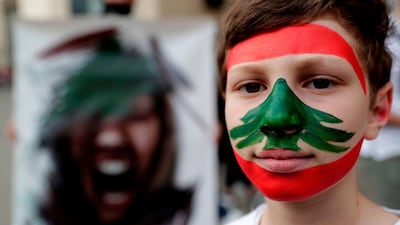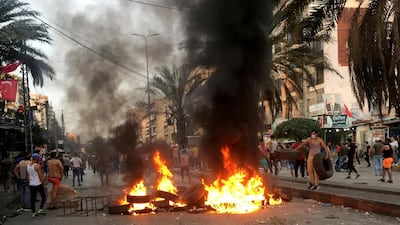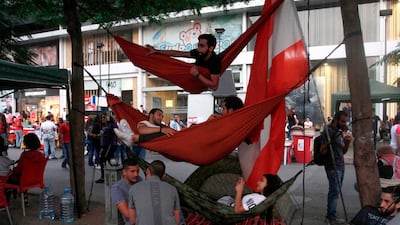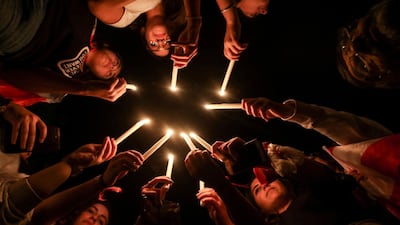Roadblocks set up by Lebanese protesters near the centre of Beirut were lifted on Sunday morning.
The move, however, was not a victory for the security forces, who made several unsuccessful attempts throughout Saturday to open the main thoroughfare ring road. It was instead a move by those on the streets to allow more to join their ranks for what activists said was going to be a major rally on the 11th day of nationwide protests.
At the main protest sites around Martyrs' and Riad Al Solh squares, community spaces sprang up, running arts and crafts workshops for children. People gathered there to discuss the future of the anti-government movement and the country as traders did brisk business selling water, snacks and food.
On Saturday, police and the army attempted to clear protesters from a stretch of the ring road that connects east and west Beirut, before another group blocked the road further along. After hours going back and forth, the police appeared to give up at around nightfall and cede the motorway to the demonstrators.
What appeared to be a new chant sprang up, with protesters modifying an almost-ubiquitous song that insults Foreign Minister Gebran Bassil to “Hela Hela Hela Hela Ho, el tariq msakkar ya helo," meaning “the road is closed, good looking”.
By dawn on Sunday, the main motorway from Beirut towards Tripoli and the north was still blocked, despite security chiefs meeting to discuss a plan on how to clear roads.
Initially sparked by a raft of new taxes, the spontaneous uprising demands an end to years of corruption, inequality, inefficient governance, unemployment and poor service provision.
Among the many issues facing Lebanon is a shortage of US dollars, a currency used interchangeably at a fixed exchange rate in the country.
On Sunday, thousands of people headed to the main north-south motorway in an attempt to create a human chain from northern Lebanon’s Tripoli to Tyre in the south.
“We have meeting points set up and people are already joining. We just have started the chain but have no idea how many people are here,” said Ghinwa, who was helping at one of the rally points.
The idea started on Instagram and Ghinwa said that within a few hours 3,000 people said they would attend.
“We want to show that Lebanese people are organised without sect or political affiliation," she said.
“We’re not trying to tell politicians anything, this is not related to politicians but it’s just to show we’re very united."

Bechara Rai, head of the Maronite Church in Lebanon, used his Sunday sermon to call on politicians to meet protesters demands “before it’s too late”.
“Seek what satisfies the people and do not ignore this uprising ... respond to our people’s needs with an act of love that would free you,” Cardinal Rai said.
The events were a continuation on Saturday evening, when tens of thousands gathered on the streets of central Beirut and in towns across the country.
In Beddawi, near Tripoli, the army appeared to open fire on protesters, leading to several casualties. The military said that it had only intervened when an altercation erupted, and that demonstrators threw stones and fireworks.
The incident did not deter tens of thousands from gathering in central Tripoli, with footage on local media showing a raucous crowd chanting and singing, despite efforts by the government to announce new reforms to ease their anger.
State Prosecutor Ghassan Oueidat said on Sunday that he had ordered a freeze on permits that allow businesses and exchange traders to take large quantities of dollars out of the country.
Throughout the weekend, discussion of which cash machines were still stocking dollars was common at protests. While banks insisted there should be no shortage of the US currency, many people said they had to try several bank branches to find it.
On Saturday, the presidential palace denied reports that President Michel Aoun blocked a bill to create an anti-corruption commission, saying that he had returned the legislation to parliament for revision.
“The adoption [of anti-corruption measures] must be expedited so that the law meets requirements but does not create areas of weakness or contradiction,” a statement read.
The bill is not the same as measures the president discussed during his first address to the nation on Thursday, his office added.
Sami Nader, director of the Levant Institute for Strategic Affairs in Beirut, told The National that it was clear that protesters want a new government, without the main political parties, to solve the acute economic crisis the country faces. They also want to start fixing the country's fragile infrastructure and to unlock the $11 billion (Dh40.4bn) in grants and loans from the international community that is tied to as-yet-unimplemented political reforms.
“If it was a corrupt administration but provided economic solutions and services, maybe it would work, but [the administration] has led to a bankrupt country, no liquidity and no jobs,” Mr Nader said.
The analyst said a body of experts and technocrats who are not affiliated with any party was the solution.
“We are in a different situation to Libya, Algeria, [and other Arab states]... we have a constitution and we’re happy with it – more or less – we just want a new government,” Mr Nader said.











